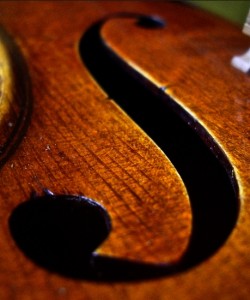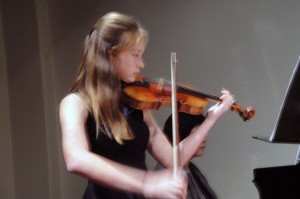Another echo from our life
We try. All of us.
In one way or another, wisely or not, effectively or not, most of us endeavor to do more than just plod through our days, passively accepting whatever bones or brickbats fate tosses our way. We seek to make the bad things less bad, the good things better, and ideally sometimes even to bring about some wonderful or fulfilling enhancement that’s all our own.
To a huge extent, my efforts have been connected in some way with the massive brickbat that prevented my firstborn son from having options in life. That adventure prompted the writing of WATB and most of the content you see on this blog.
But there are other corners of life as well—areas that might have benefited from a little more attention, had that been feasible. Perhaps you’ll like this little reminiscence.
Finding Joy in Treble Clef
My father was a violinist from what I think of as “the old German school,” and by that I mean to say he took a very stern, no-nonsense approach to playing. I know he did enjoy listening to good music. But when Dad picked up his own instrument, pleasure seemed to be the last thing on his mind. His focus remained on technique. Was that left arm supple enough? Were those fingers consistently coming down on the strings like little hammers? Although an accomplished musician ought to have progressed beyond such challenges, Dad had begun noting the effects of arthritis. He believed he might slow the progress of that malady through painstaking attention to every detail when playing. So he practiced by the hour—but only scales and etudes. I don’t recall hearing him play actual pieces. Surely, music must have meant more to him at an earlier point in life, but that would have been before my time.
Dad gave me my first lessons in the violin, and he made darn sure I never formed any of the typical beginner’s bad habits. The palm of my left hand never, ever contacted the neck. The instrument remained parallel with the floor. And that bow grip: just so! Then of course there was mastery of time signatures and keys and all those other wickets that he said separated respectable players from the pretenders.
This background enabled me to elicit appreciative nods from subsequent teachers.
But something important was missing in my understanding of music. Let’s call it joy. I practiced with the school orchestra in the same frame of mind that I took to math class. Eventually I noted that only one of those activities was actually required. As a teenager, I gave up playing.
Some years later I had a little epiphany while watching a friend playing guitar at a square dance. That guy looked just as happy as it’s possible for anyone to be, and obviously his happiness came from the creation of music. This, I realized, is what music is really about: calling forth the appreciation of life in yourself and others.
Yes, technique makes all the difference in producing the sounds we want to hear. On the other hand, good musicians know that “playing by the book” is a soulless pastime.
Adults have complex lives, with competing obligations and little free time, but I wanted to get back into music. Fearful of slipping into the same old groove, I switched to guitar. Much later, I began piano lessons. I enjoyed both instruments, but over time realized that they just weren’t my instruments. Finally, in 2008, I picked up the violin once again, after having been away from it 40 years.
Guess what, Dad? I still had the muscle memory for holding and playing it correctly (albeit without much panache). Some things we never forget.
Today, music evokes a sort of bittersweet affection. The violin feels like a girlfriend from whom I’ve been separated all my life. I cannot avoid wondering what we might have done together. But on the other hand I’m raising a couple of kids who now play it as well, one of whom is already better than either my father or me. It’s an honor, and a responsibility, to be able to influence the trajectory they take.
If they absorb just one thing about music from me, I hope it’s love.
Tags:


2. August 2013 at 02:46
Quite a well-written piece! Even the professionals fall into two camps it seems: 80% of them are technicians, nitpicking over every sour note; the other 20% are musicians who use music as an expressive device, channeling the gamut of human emotion.
I would say that only 1% of the latter group truly become artists, which is to say that they are interested in creating that which was not there before. For me, conjuring new realities and unseen possibilities is the artist’s job. I believe that this is the greatest gift that music can give to humanity: the willingness to look outside of the box and see what is possible when we stop talking/doing/acting and simply listen.
Maybe if people could learn more from the music around us, we’d see a lot less anxiety and upset in ourselves and those around us. Ultimately, it is not a question as to whether one can play; that’s not entirely important. It’s the constant realm of possibility and wonder that music instills within all of us that is absolutely vital for us to experience!